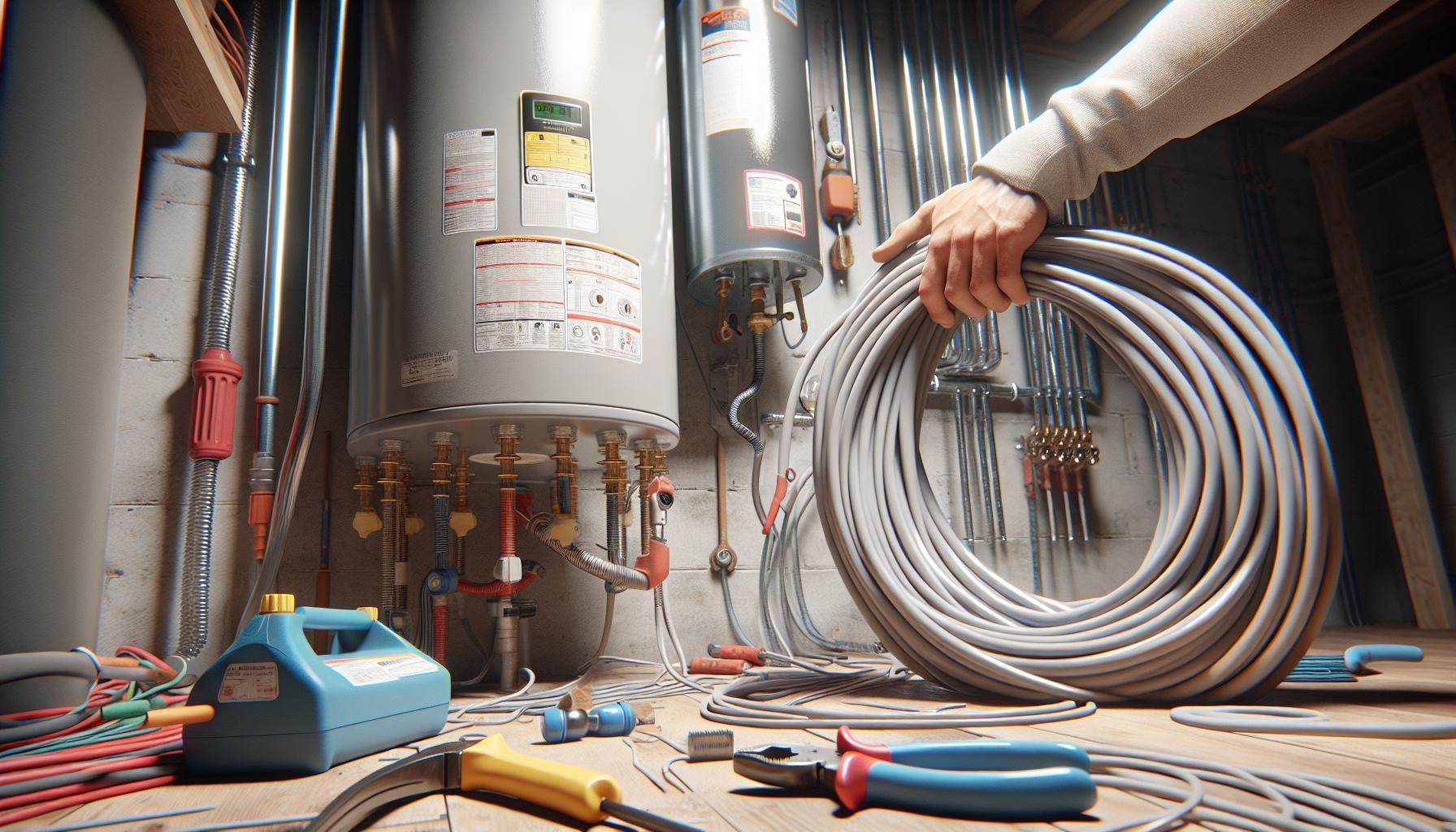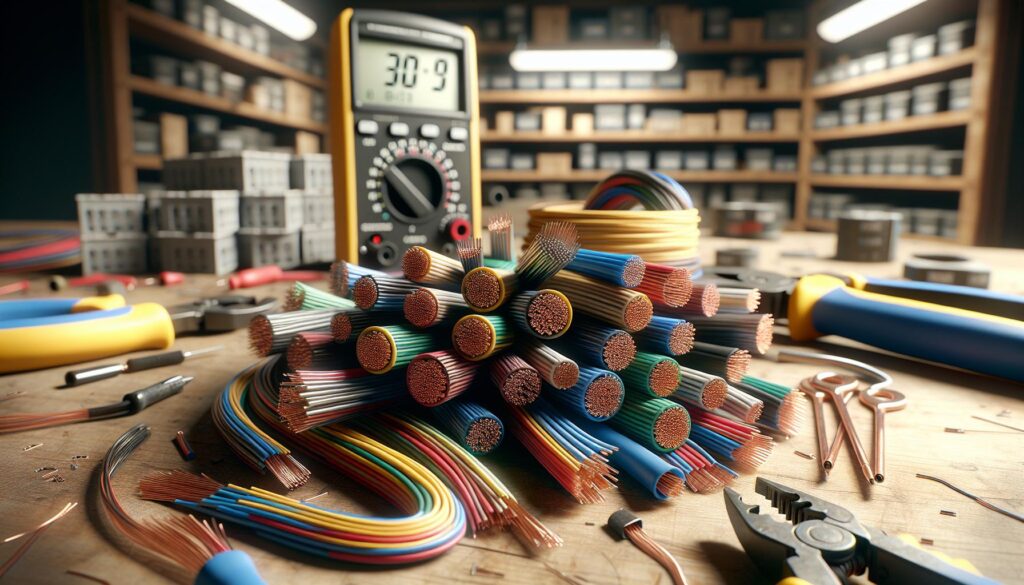Choosing the right gauge wire for a hot water heater is crucial for both safety and efficiency. Many homeowners underestimate the importance of proper wiring, but using the correct gauge can prevent overheating, ensure optimal performance, and extend the lifespan of the unit. With various sizes available, it’s essential to understand which gauge meets the specific requirements of the heater.
Electric hot water heaters typically require a minimum wire gauge to handle the amperage safely. Factors such as the heater’s voltage and distance from the power source also play a significant role in determining the appropriate wire size. This guide will help clarify the best practices for selecting the right gauge wire, ensuring a reliable and safe hot water supply for any household.
What Gauge Wire For hot Water Heater
Understanding wire gauges is essential for selecting the appropriate wiring for hot water heaters. Wire gauge indicates the diameter of the wire and affects electrical resistance. Smaller gauge numbers represent thicker wires, while larger numbers indicate thinner wires.
Electrical requirements for hot water heaters depend on the amperage drawn by the unit. Most electric hot water heaters require either 10, 12, or 14-gauge wire, depending on the unit’s amperage rating. For example, a typical electric hot water heater with a 30-amp breaker usually requires 10-gauge wire, while units with 20-amp breakers often use 12-gauge wire.
Distance from the power source plays a vital role in wire gauge selection. Longer distances may necessitate a thicker wire to reduce voltage drop. A voltage drop exceeding 3% can affect performance and efficiency, leading to potential overheating. Therefore, using at least 10-gauge wire for long runs (over 100 feet) is advisable for high-demand units.
Installation practices also impact safety and functionality. It’s crucial to follow local electrical codes when selecting wire gauge. Proper grounding and connection practices should accompany gauge selection to prevent electrical hazards and ensure optimal performance.
Choosing the right wire gauge not only enhances the efficiency of the hot water heater but also ensures it operates safely, protecting against electrical risks and prolonging the heater’s lifespan.
Importance of Choosing the Right Gauge

Choosing the correct wire gauge is crucial for ensuring a safe and efficient hot water heater operation. The right gauge minimizes risks and maximizes performance, ultimately leading to energy savings.
Safety Considerations
Safety plays a critical role in wire selection. Using the appropriate wire gauge prevents overheating, which can lead to electrical fires. Wires that are too thin for the electrical load can cause insulation to degrade, increasing the risk of short circuits. Following local electrical codes ensures compliance with safety standards, decreasing hazards related to improper installation. Consulting with a licensed electrician can further guarantee the safety of electrical connections.
Efficiency and Performance
Efficiency and performance directly relate to wire gauge selection. Thicker wires, indicated by smaller gauge numbers, facilitate better conductivity, reducing voltage drop over longer distances. This enhanced conductivity translates to improved performance of the hot water heater, allowing it to operate within its optimal range. Using the right wire gauge also translates into lower energy costs, as it prevents energy loss during transmission. Properly sized wires help maintain consistent water temperatures and support the unit’s longevity by reducing strain on the system.
Recommended Wire Gauges for Hot Water Heaters
Selecting the proper wire gauge for hot water heaters is essential for reliable performance and safety. The appropriate gauge varies based on the type of unit and its specific requirements.
Electric Hot Water Heaters
Most electric hot water heaters require either 10, 12, or 14-gauge wire. The choice depends on the unit’s amperage rating:
| Amperage Rating | Recommended Wire Gauge |
|---|---|
| Up to 30 Amps | 10 Gauge |
| 30 to 40 Amps | 8 Gauge |
| 40 to 50 Amps | 6 Gauge |
Thicker wires, represented by lower gauge numbers, are vital for units with higher amperage to prevent overheating and ensure efficient power delivery. Additionally, longer distances from the power source necessitate using thicker wire to combat voltage drop, affecting heater performance.
Gas Hot Water Heaters
Gas hot water heaters typically don’t require special wiring for ignition but need proper electrical connections for the thermostat and ignition system. These connections generally use 14-gauge wire, connecting to a standard 120-volt outlet.
Considering local electrical codes remains crucial for both electric and gas models to ensure compliance and safety. Consulting with a licensed electrician ensures the correct wire gauge and installation for optimal function.
Factors Influencing Wire Gauge Selection
Selecting the appropriate wire gauge for a hot water heater depends on several factors that directly affect safety and efficiency. Understanding these factors ensures optimal performance and compliance with electrical standards.
Distance from Power Source
Distance from the power source significantly impacts wire gauge selection. Longer distances increase the likelihood of voltage drop, which can reduce the efficiency of the hot water heater. To maintain adequate voltage at the appliance, thicker wires are necessary. For runs exceeding 50 feet, it’s advisable to consider a wire gauge that is two sizes thicker than the minimum requirements. For instance, a unit requiring 10-gauge wire at a short distance may need 8-gauge wire if installed 100 feet away from the power supply.
Heater Specifications
Heater specifications play a crucial role in determining wire gauge. Each electric hot water heater has a specific amperage requirement based on its power rating. For example, a heater with a 30-amp rating necessitates at least 10-gauge wire, while those rated between 30 to 40 amps require 8-gauge wire. Additionally, the voltage rating, typically either 120 or 240 volts, impacts the choice of wire. Compliance with the manufacturer’s specifications is essential to ensure safe and efficient operation. Always refer to the owner’s manual or consult a licensed electrician to confirm the correct wire gauge based on the specific heater model.
Proper Wire Selection
Choosing the right wire gauge for a hot water heater is crucial for both safety and efficiency. Proper wire selection not only prevents overheating but also enhances the unit’s performance and longevity. By understanding the specific requirements based on amperage and distance from the power source, homeowners can make informed decisions. It’s essential to adhere to local electrical codes and consult with a licensed electrician when in doubt. This ensures that the installation meets safety standards and provides a reliable hot water supply. Making the right choice in wire gauge ultimately leads to a more efficient and safe home environment.


